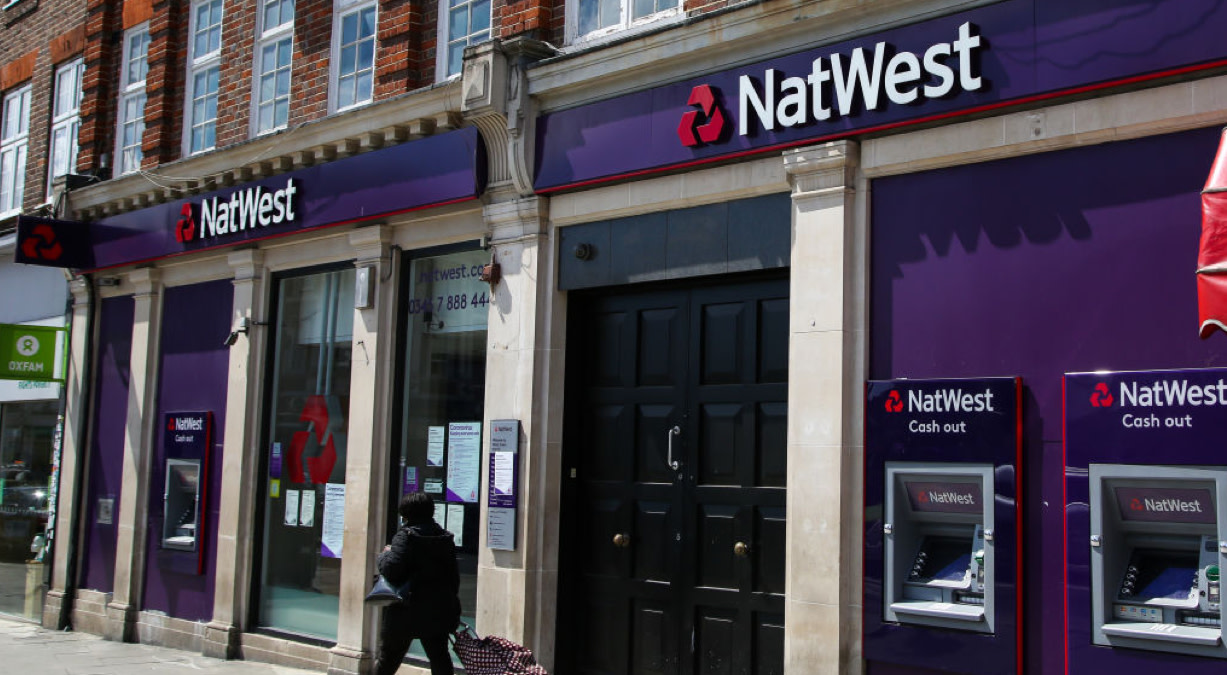NatWest reported first-quarter income of £3.5bn, down 10% driven by lower net interest income. This was broadly flat compared to the fourth quarter of last year. Net interest margin fell from 2.25% to 2.05%, a better result than markets were expecting.
Pre-tax operating profit of £1.3bn was down 27%, which was in line with the £1.3bn markets were expecting. Impairment losses of £93 were lower than the £186mn markets were expecting.
Customer loans rose 1.3% to £357bn, while customer deposits were broadly flat at £420bn.
The group’s CET1 ratio, a key measure of financial strength, is 13.5% - in the middle of the 13-14% target range.
The shares rose 4.7% in early trading.
Our view
NatWest is putting in some good results. Net interest margin ticked higher from the previous quarter and both customer loans and deposit levels grew. Performance isn’t as good as this time last year, but markets have been expecting that for some time. It’s about looking forward now, not back.
As a traditional lender, loan default rates are an important risk to watch for. Impairment charges (money put aside in anticipation of more people defaulting on loan payments) were better than expected as customers continued to show remarkable resilience in the face of higher inflation and interest rates. We think it's reasonable to expect low default rates to continue over 2024.
Deposits make up the other side of the equation and we continue to see retail customers in search of better rates from longer-term savings accounts. That's been an ongoing headwind over the past year. But crucially for NatWest, the pace of deposit switching was significantly slower than what we saw last year. It looks like the peak in switching has come and gone. That'd be good news for margins - something for investors to monitor.
Costs are a challenge and a key focus for the new CEO. We've been pleased to see continued progress on this front - medium-term targets look for sub 50% cost-income ratio but we don't expect that to come anytime soon.
Mortgage pricing is currently a pain point, as more profitable business written over the pandemic is replaced. But that headwind should ease over 2024. There's also the benefit from the structural hedge - think of this like a bond portfolio that's set to roll on to better rates over the coming years. NatWest is rolling off some of the lowest rates in the sector, and should be one of the biggest beneficiaries.
We also think management have been overly cautious with their £13-£13.5bn income guide. This implies 5 rate cuts before the end of the year which looks extremely unlikely. That leaves room for guidance to be raised as we move through the year, though there are no guarantees.
The UK banking sector is unloved, but with strong balance sheets and some easing headwinds on the horizon there’s potential. We see NatWest as being well placed to benefit, with an attractive valuation and a prospective dividend yield of 5.8% plus the potential for buybacks. No returns are guaranteed and there are still risks from a new management team and an economic outlook that, while improving, is still uncertain.
Environmental, Social and governance (ESG) risk
The financials sector is medium-risk in terms of ESG. Product governance is the largest risk for most companies, especially those in the US and Europe with enhanced regulatory scrutiny. Data privacy and security are also an increasingly important risk for banks and diversified financial firms. Business ethics, ESG integration and labour relations are also worth monitoring.
According to Sustainalytics, NatWest’s management of material ESG issues is strong.
NatWest is resolving some longstanding issues but still faces legal challenges and subpar money laundering policies. Its product management lacks detail and oversight, posing risks under new consumer protection laws. Although there are gaps in data privacy and security, NatWest effectively mitigates cyber threats. Last year’s governance issues relating to CEO conduct still weigh on sentiment, though a new Chair and CEO are now in place.
The UK government has confirmed its intentions to sell its stake in NatWest to the general public. HL expects to be an intermediary in this share sale.
NatWest key facts
All ratios are sourced from Refinitiv, based on previous day’s closing values. Please remember yields are variable and not a reliable indicator of future income. Keep in mind key figures shouldn’t be looked at on their own – it’s important to understand the big picture.
This article is not advice or a recommendation to buy, sell or hold any investment.No view is given on the present or future value or price of any investment, and investors should form their own view on any proposed investment.This article has not been prepared in accordance with legal requirements designed to promote the independence of investment research and is considered a marketing communication.Non - independent research is not subject to FCA rules prohibiting dealing ahead of research, however HL has put controls in place(including dealing restrictions, physical and information barriers) to manage potential conflicts of interest presented by such dealing.Please see our full non - independent research disclosure for more information.


